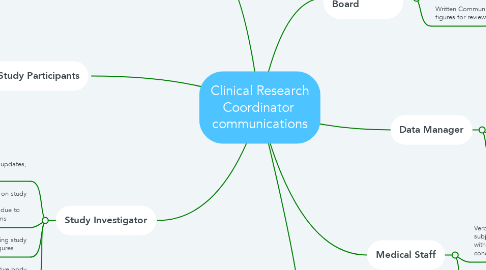Clinical Research Coordinator communications
by Lyndsay Rayner

1. Off-site Staff
1.1. Written Communication: ensuring clear instructions for off-site specimen analysis, email confirmation of timelines/due dates
1.2. Verbal communication: phone calls, in-person confirmation of tests needed and description of results
2. Study Participants
2.1. Verbal communication: providing description of symptoms, in person conversations/ phone calls
2.2. Visual communication: sharing graphs and figures
2.3. Written communication: confirmation of consent, information packages, emails
2.4. Nonverbal communication:positive and reassuring body language
3. Study Investigator
3.1. Written Communication: email updates, editing/maintenance of SOPs
3.2. Verbal Communication: updates on study subjects i.e. if they are healthy/experiencing any effects due to intervention, phone calls, telecoms
3.3. Visual Communication: sending study projections via graphs and figures
3.4. Non-Verbal Communication: positive body language
4. Study Sponsor
4.1. Written Communication: Signing of documents pertaining to official sponsorship, approving of protocols
4.2. Verbal Communication: phone calls, in-person discussion of study progress
4.3. Visual communication: Study updates through graphs and figures
5. Data Manager
5.1. Verbal Communication: In person discussion/ telecom phone calls with investigator/ additional study staff
5.2. Written Communication: Emails, graphs, figures, budgets
6. Ethics Review Board
6.1. Verbal Communication: In person discussion/ phone calls
6.2. Written Communication: Emails, graphs, figures for review for approval
7. Medical Staff
7.1. Verbal Communication: talking about study subjects, reporting to study investigator with any important updates to subject condition
7.2. Written Communication: patient progress notes, emails with other study staff,


